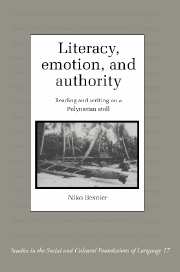Book contents
- Frontmatter
- Contents
- List of illustrations and tables
- Acknowledgments
- Transcription conventions and orthography
- 1 Introduction
- 2 The ethnographic context
- 3 The domains of reading and writing
- 4 Letter writing and reading
- 5 Letters, economics, and emotionality
- 6 Between literacy and orality: the sermon
- 7 Literacy, truth, and authority
- 8 Conclusion
- Notes
- References
- Index of Tuvaluan words
- General index
8 - Conclusion
Published online by Cambridge University Press: 14 August 2009
- Frontmatter
- Contents
- List of illustrations and tables
- Acknowledgments
- Transcription conventions and orthography
- 1 Introduction
- 2 The ethnographic context
- 3 The domains of reading and writing
- 4 Letter writing and reading
- 5 Letters, economics, and emotionality
- 6 Between literacy and orality: the sermon
- 7 Literacy, truth, and authority
- 8 Conclusion
- Notes
- References
- Index of Tuvaluan words
- General index
Summary
In the foregoing chapters, I investigated the social, ideological, and textual characteristics of literacy on Nukulaelae, and explored the implications that the two principal types of literacy have for a theoretical understanding of literacy in its social and ideological context. In this conclusion, I turn to the questions that an examination of the full panoply of Nukulaelae literacy practices and events raises. In other words, having presented an event-centered examination of literacy on the atoll, I now analyze the same material from what I called in the introduction a comparative-ethnographic stance.
The ethnographic study of literacy is part and parcel of the broader concerns that have driven anthropological thought since its early formulation (cf. Tambiah 1990): do modes of thought (or “mentalities”) share a common core in all societies? If so, what is this common core, and where is it located? If not, what is the quality of differences across modes of thought? What types of groups do the differences define? And are the differences mere elaborations of a universal grounding? To apply these questions to the investigation of literacy, one must first recognize that literacy, rather than transcending the social and the cultural, is embroiled in social and cultural processes. That literacy is entangled in social processes is demonstrated by the important role that it commonly plays in the formation and maintenance of inequality between social classes, women and men, and the center and the periphery.
- Type
- Chapter
- Information
- Literacy, Emotion and AuthorityReading and Writing on a Polynesian Atoll, pp. 169 - 187Publisher: Cambridge University PressPrint publication year: 1995

